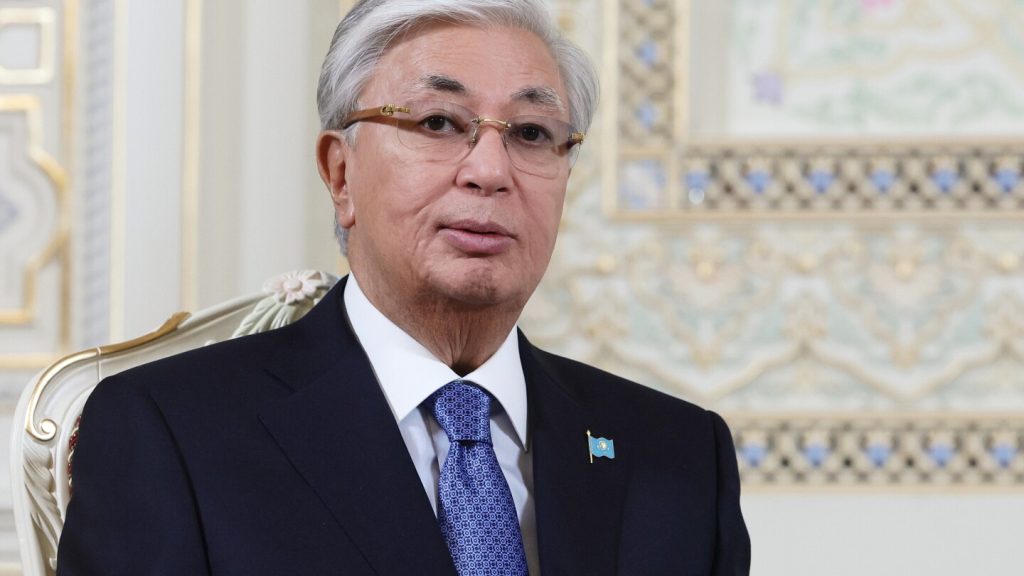Listen to the article
Kazakhstan to Join Abraham Accords, Expanding Trump’s Middle East Initiative
Kazakhstan will soon officially join the Abraham Accords, a signature foreign policy achievement from former President Donald Trump’s first administration that normalized relations between Israel and several Arab and Muslim-majority nations.
The announcement represents a symbolic victory for the Trump administration rather than a dramatic diplomatic breakthrough. Kazakhstan has maintained formal diplomatic relations with Israel since 1992, shortly after gaining independence following the Soviet Union’s collapse. This distinguishes it from other Abraham Accords signatories like Bahrain, Morocco, Sudan and the United Arab Emirates, which established diplomatic ties with Israel as part of joining the initiative.
President Trump announced the development on social media following what he described as “a great call” between Israeli Prime Minister Benjamin Netanyahu and Kazakh President Kassym-Jomart Tokayev. Trump characterized Kazakhstan as “the first Country of my Second Term to join the Abraham Accords,” adding that it would be “the first of many.”
“A major step forward in building bridges across the World,” Trump wrote, emphasizing that “more Nations are lining up to embrace Peace and Prosperity through my Abraham Accords.” He indicated a formal signing ceremony would take place soon and that “many more Countries” were seeking to join what he called a “club of STRENGTH.”
The move comes as Trump hosted a summit Thursday evening with leaders from the five Central Asian nations, including Kazakhstan. Earlier that day, Secretary of State Marco Rubio met with President Tokayev for a working breakfast, though State Department statements made no mention of the Abraham Accords, instead focusing on “expanding opportunities for commercial trade and investment as well as increased cooperation with Kazakhstan in energy, technology, and infrastructure.”
U.S. officials speaking anonymously to The Associated Press stressed that Kazakhstan’s participation remains significant despite the existing diplomatic relationship. They suggested it would enhance bilateral trade and cooperation while sending an important signal that Israel is becoming less isolated internationally. This comes at a critical time following widespread criticism and protests over Israel’s conduct during the ongoing war against Hamas in Gaza.
One official claimed that Trump’s emerging peace plan for Gaza had “completely changed the paradigm,” creating a “circle of peace” that numerous countries now wish to join. The official highlighted several areas where Israeli-Kazakh cooperation would intensify, including defense, cybersecurity, energy and food technology—though these sectors have been subjects of bilateral agreements dating back to the mid-1990s.
Geographically, Kazakhstan is situated much farther from Israel than the other Abraham Accords nations, making this agreement more about symbolic support for the Trump-led initiative than a dramatic reshaping of regional dynamics. Still, the Trump administration views any expansion of the Accords as reinforcement of what they consider a signature foreign policy achievement.
The Abraham Accords were first established during Trump’s initial term, beginning with the UAE’s agreement to normalize relations with Israel in August 2020. Bahrain, Morocco and Sudan subsequently joined the initiative, though Sudan’s participation has been complicated by internal political turmoil.
The Biden administration had continued to support expansion of the Abraham Accords during its term, but progress stalled amid regional tensions, particularly following the outbreak of war between Israel and Hamas in October 2023. Trump has repeatedly highlighted the Accords as evidence of his dealmaking skills and commitment to what he terms “peace through strength” in international relations.
Fact Checker
Verify the accuracy of this article using The Disinformation Commission analysis and real-time sources.




13 Comments
Kazakhstan’s move to join the Abraham Accords is a pragmatic geopolitical decision. Strengthening ties with Israel, a key US ally, could have benefits for the Kazakh economy and its global standing.
Absolutely. Kazakhstan is likely looking to diversify its international relationships and capitalize on new business opportunities.
Interesting move by Kazakhstan to join the Abraham Accords. Strengthening ties with Israel could open up new economic and diplomatic opportunities for the country.
Agreed. This symbolic gesture shows Kazakhstan’s willingness to engage more with the Middle East region.
As a major producer of critical minerals like uranium, lithium, and rare earths, Kazakhstan’s participation in the Abraham Accords could impact global supply chains and trade in these strategic commodities.
As a major uranium producer, Kazakhstan’s participation in the Abraham Accords could have implications for the global nuclear energy industry. It will be interesting to see if this leads to any new uranium supply deals or projects.
The Abraham Accords have been a key foreign policy achievement for the Trump administration. Expanding the initiative to include Kazakhstan is a positive step, though the impact may be limited.
True, Kazakhstan already had diplomatic relations with Israel, so this is more symbolic than a major breakthrough. But it’s still noteworthy.
Kazakhstan is an important player in the global mining and commodities landscape. Its closer ties with Israel through the Abraham Accords could create new business opportunities in areas like technology, innovation, and R&D.
Good point. Collaboration in mining-related technologies and processes could benefit both countries.
The Trump administration touted the Abraham Accords as a major foreign policy achievement. Kazakhstan’s decision to join, even if largely symbolic, lends some additional credibility to the initiative.
Agreed. Having another country, especially one with Kazakhstan’s regional influence, join the Accords helps validate the Trump team’s efforts.
While the Abraham Accords are a diplomatic initiative, they also have economic implications. Kazakhstan’s participation could open doors for Israeli companies looking to invest in the country’s mining and energy sectors.